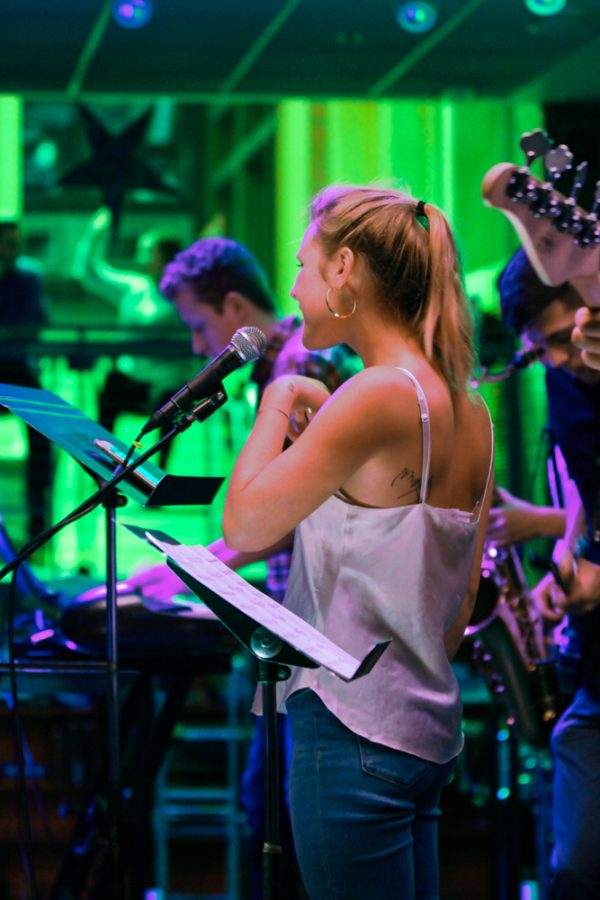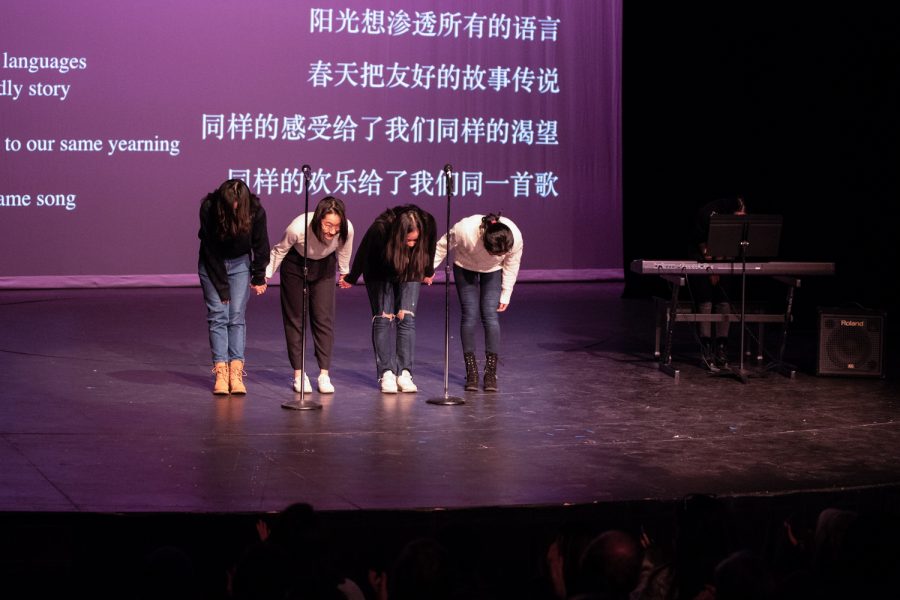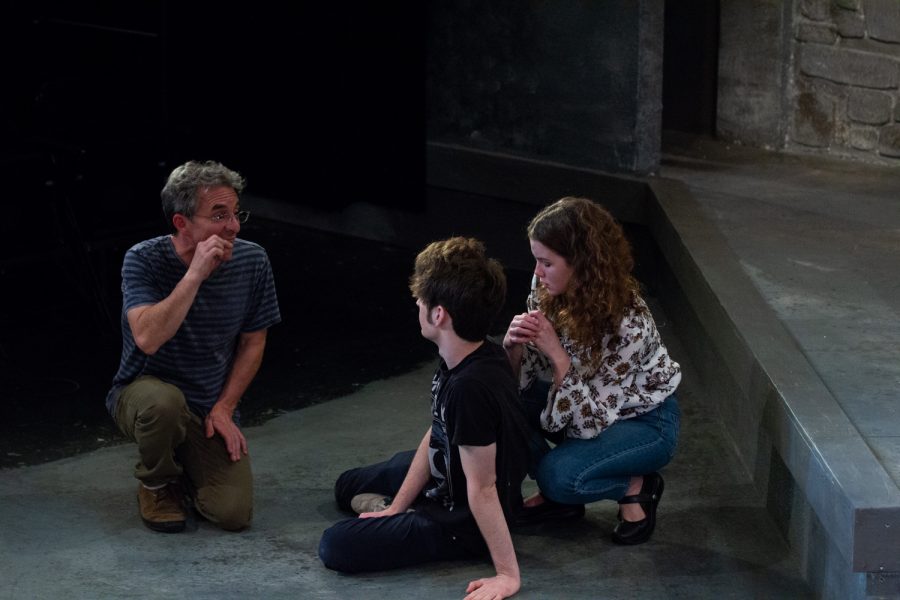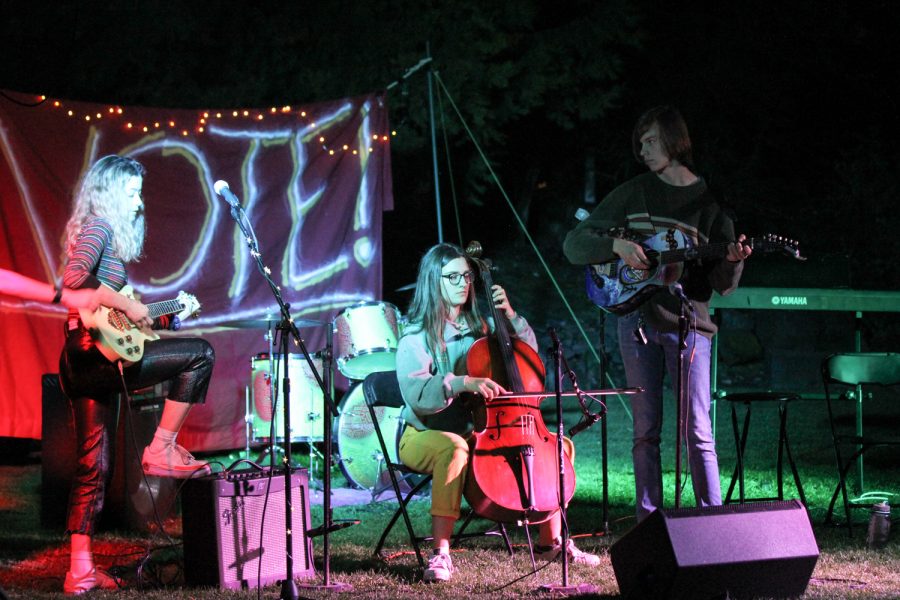
Director Chris Petit is a man with a vision.
“You want to make that more of a struggle,” he says to Lady Capulet, portrayed by sophomore Caitlin Goldie, as her husband, senior Spenser Meeks, pulls her away from her daughter’s still form.
At rehearsals for Whitman’s production of Romeo and Juliet, the cast and crew wrestled with details while I huddled in the back row with sophomore props technician Niccole Cluff and talked shop.
More photos from “Romeo and Juliet”
“I work closely with the set designer . . . The visuals [of this play] are going to be lovely. The staging is fantastic and the lighting is fantastic, which automatically makes it gorgeous,” Cluff said.
Piercing feedback screeched over the monitors, stunning everyone into momentary silence. The sound team dispatched someone to turn off the amps. The work moved on. Scooting down the row, I found the actor playing Balthasar, first-year Yoni Evans, passing the dark minutes offstage. He offered more insight into the play’s gritty urban visuals.
“Along stage right, there’s going to be corrugated metal, which has already been spray-painted to look like urban graffiti. It’s trying to bring this undefined cultural [feeling] you find in places like Barcelona, places in Europe, big cities where there are gangs and a strong street culture,” said Evans.
These visuals spring from a holistic yet modern re-imagining of Shakespeare’s classic, which updates the conflicts and tensions into a setting closer to our own experience of love and violence. The actors retain their American accents and the high-class Montague and Capulet families derive their power from gangs and organized crime rather than title.
“The Montagues’ young people: Benvolio, Balthasar, Romeo: they’re a skateboard gang. There’s going to be a lot of skateboard stuff. The Capulets are kind of a creepy, cultish gang,” Evans said.
Junior Anastasia Higham, Juliet, discussed the effects of the play’s modernization on its deep concepts and the contrast between modern and Elizabethan values.
“Religion is very important to these characters, in a way that is much more of Shakespeare’s time than of today,” she said. “Also the importance of virginity: these are not modern concepts and we’re not trying to make them that. It’s another world. The modern youth violence is real, but it has this ancient feud that it’s coming from.”
Higham spoke enthusiastically about working with director Chris Petit.
“He’s great: I’ve been wanting to work with him for a long time. I’m taking two other classes from him, which is really helpful: an acting class and a movement class. And that really helped,” Higham said.
Higham also remarked that the character of Mercutio has been converted to a woman, an edgy role taken on by senior Lara Spengler.
“There’s a really different dynamic between Romeo and Mercutio. The idea is being in love with your best friend and him having no interest in you whatsoever. There’s also a whole lot of gender issues: [Tybalt] makes fun of me for being a woman and wanting to fight him, so it adds a whole new component,” Spengler said.
At the end of a lengthy rehearsal, director Chris Petit spoke about the overall challenges of the production.
“There are certain scenes that I cut; pages of ‘O woe is me’ that are difficult for a modern audience, so I guess the biggest challenge is keeping the story together, with the dramatic arc, and the modern values,” Petit said.
Petit also spoke to the dual nature of the play.
“And the play is a strange play; it’s a tragedy but it’s kind of also a comedy. The story comes from what we could call a dime-store romance novel and what makes it have depth is Shakespeare’s language . . . I wanted to find a balance between having a show in two hours and keeping the story.”
I tried to wheedle more sneak peaks, but he was secretive.
“Come see the show,” Petit said with a smile.





